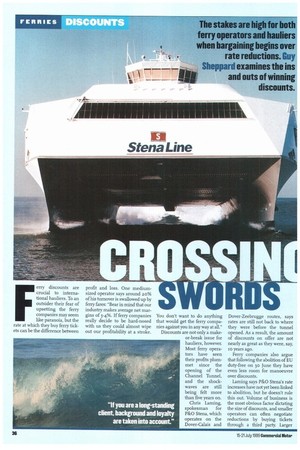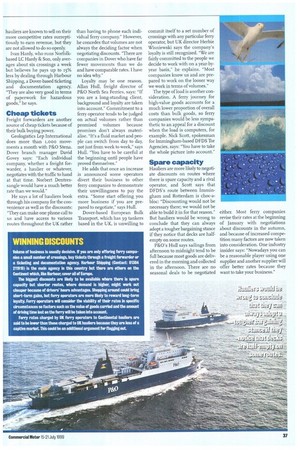C110 . 1i#1 IF , erry discounts are crucial to international hauliers. To
Page 38

Page 39

If you've noticed an error in this article please click here to report it so we can fix it.
an outsider their fear of upsetting the ferry companies may seem like paranoia, but the rate at which they buy ferry tickets can be the difference between
profit and loss. One mediumsized operator says around 20% of his turnover is swallowed up by ferry fares: "Bear in mind that our industry makes average net margins of 3-4%. If ferry companies really decide to be hard-nosed with us they could almost wipe out our profitability at a stroke. You don't want to do anything that would get the ferry companies against you in any way at all."
Discounts are not only a makeor-break issue for hauliers, however. Most ferry operators have seen their profits plummet since the opening of the Channel Tunnel, and the shockwaves are still being felt more than five years on.
Chris Laming, spokesman for P&O Stena, which operates on the Dover-Calais and Dover-Zeebrugge routes, says rates are still not back to where they were before the tunnel opened. As a result, the amount of discounts on offer are not nearly as great as they were, say, to years ago.
Ferry companies also argue that following the abolition of EU duty-free on 30 June they have even less room for manoeuvre over discounts.
Laming says P&O Stein's rate increases have not yet been linked to abolition, but he doesn't rule this out. Volume of business is the most obvious factor dictating the size of discounts, and smaller operators can often negotiate reductions by buying tickets through a third party. Larger hauliers are known to sell on their more competitive rates surreptitiously to earn revenue, but they are not allowed to do so openly.
Ivan Hardy, who runs Norfolkbased LC Hardy & Son, only averages about six crossings a week but believes he pays up to 15% less by dealing through Harbour Shipping, a Dover-based ticketing and documentation agency. "They are also very good in terms of paperwork for hazardous goods," he says.
Cheap tickets
Freight forwarders are another source of cheap tickets because of their bulk buying power.
Geologistics Lep International does more than L000 movements a month with P&O Stena. Dover branch manager David Govey says: "Each individual company, whether a freight forwarder, a haulier or whatever, negotiates with the traffic to hand at that time. Norbert Dentressangle would have a much better rate than we would."
He says a lot of hauliers book through his company for the convenience as well as the discounts: "They can make one phone call to us and have access to various routes throughout the UK rather than having to phone each individual ferry company." However, he concedes that volumes are not always the deciding factor when negotiating discounts. "There are companies in Dover who have far fewer movements than we do and have comparable rates. [have no idea why."
Loyalty may be one reason. Allan Hull, freight director of P&O North Sea Ferries, says: "If you are a long-standing client, background and loyalty are taken into account." Commitment to a ferry operator tends to be judged on actual volumes rather than promised volumes because promises don't always materialise. "It's a fluid market and people can switch from day to day, not just from week to week," says Hull. "You have to be careful at the beginning until people have proved themselves."
He adds that once an increase is announced some operators divert their business to other ferry companies to demonstrate their unwillingness to pay the extra. "Some start offering you more business if you are prepared to negotiate," says Hull.
Dover-based European Bulk Transport, which has 39 tankers based in the UK, is unwilling to commit itself to a set number of crossings with any particular ferry operator, but UK director Herbie Wisniewslci says the company's loyalty is still recognised. "We are fairly committed to the people we decide to work with on a year-byyear basis," he explains. "Most companies know us and are prepared to work on the looser way we work in terms of volumes."
The type of load is another consideration. A ferry journey for high-value goods accounts for a much lower proportion of overall costs than bulk goods, so ferry companies would be less sympathetic to an appeal for a discount when the load is computers, for example. Nick Scott, spokesman for Immingham-based DFDS Tor Agencies, says: "You have to take the whole picture into account"
Spare capacity
Hauliers are more likely to negotiate discounts on routes where there is spare capacity and a rival operator, and Scott says that DF DS's route between Immingham and Rotterdam is choc-abloc: "Discounting would not be necessary there; we would not be able to build it in for that reason." But hauliers would be wrong to conclude that they can always adopt a tougher bargaining stance if they notice that decks are halfempty on some routes.
P&O's Hull says sailings from afternoon to midnight tend to be full because most goods are delivered in the morning and collected in the afternoon. There are no seasonal deals to be negotiated either. Most ferry companies revise their rates at the beginning of January with negotiations about discounts in the autumn, and because of increased competition many factors are now taken into consideration. One industry insider says: "Nowadays you can be a reasonable player using one supplier and another supplier will offer better rates because they want to take your business."












































































































